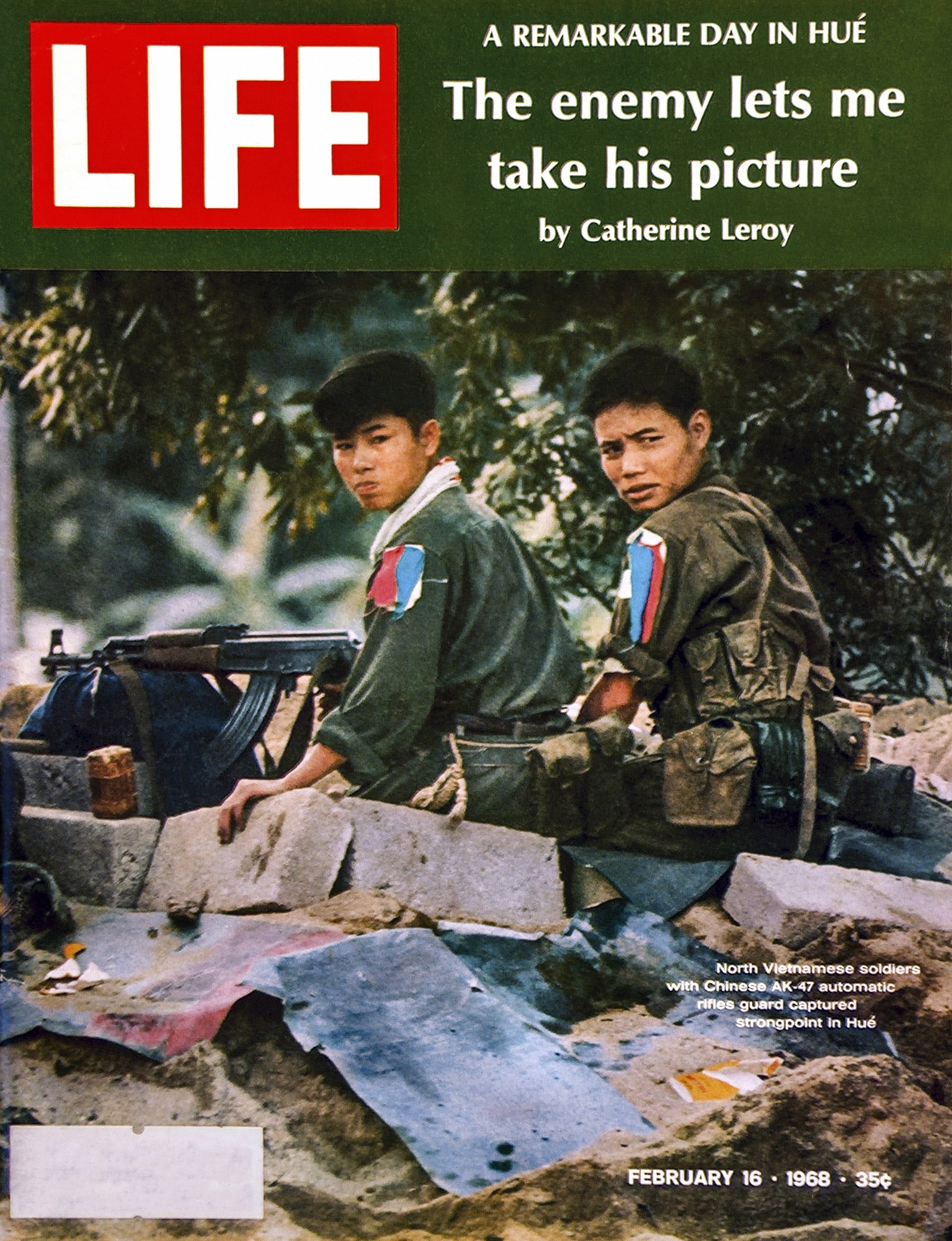
University of Missouri (USA): Lecture and slide-show on the occasion of Catherine Leroy’s “Award for Distinguished Service in Journalism” from the University of Missouri (1997).
University of California – Berkeley (USA): “Journalists under Fire: Vietnam and Iraq“ panel-discussion at the Graduate School of Journalism, on the occasion of the exhibition “Under Fire: Vietnam War Photographs by Catherine Leroy” in the presence of Leroy and Don McCullin (April 2005).
Life magazine: “The enemy lets me take his picture”, full transcription of Catherine Leroy’s cover story text published on February 16, 1968.
Coming soon...
A tense interlude with the enemy in Hué
We were peddling our rickety bicycle right into the outskirts of Hué before the bullets started popping all around and we realized just how much trouble we were in. François Mazure, a correspondent for Agence France-Presse, and I had started out that morning from the Marine base at Phu Baï to find out about the fighting. We hitchhiked a ride with an American convoy to a point about four miles south of the city. We hadn’t seen any sign of the Marines a general had told us would be guarding the road, so we changed into civilian clothes we had brought along —just in case this kind of situation arose. We had rented the old bicycle from a French-speaking Vietnamese who lived along the road, and continued north riding tandem.
The road was empty now, the people hiding in their houses. We were growing nervous, and whenever we did see people peering from their houses François called “Bonjour, bonjour”, very loud and friendly, to show that we were French and not American. We reached the edge of the city and passed a big market-place, and that’s when the shooting started. People were standing about in little knots, and we walked up to them shouting “Phap bao chi bale !” — “French Press from Paris” — but they wouldn’t look at us.
We stayed in the market place for about two hours, while the shooting continued and South Vietnamese fighter-bombers flew air strikes against the walled citadel of Hué about a mile to the north. We realized by now that we were in a part of the city controlled by the Communists. Finally a man directed us to a nearby cathedral where he thought we might be safe.
The cathedral and the ground around it swarmed with refugees from the two days of fighting in the city [January 31st – February 1st]. François kept saying “Phap bao chi, phap bao chi,” but the people did not look happy to see us. Hundreds of children surrounded us. They were silent and wide-eyed and hostile, and they pressed against us, pushing in from all sides. I was glad when a priest arrived —a good-looking Vietnamese of about 40, who spoke French with great elegance and precision. The wife of Bao Daï, the last emperor, had found refuge in this church, he told us, during a Viet Minh insurrection more than 20 years ago, and we were welcome to stay the night. The priest showed us around the cathedral and grounds. There were about 4,000 refugees, most of them women and children and old men. There were about 10 wounded, and one woman had just given birth to a baby. She lay on the floor in front of a confessional. Inside, the sound of all the people talking and the children crying was incredible, a rolling, continuous roar. That night we slept in the priest’s room — or tried to. Next door in another room all the priests were praying loudly in Vietnamese, and their prayers were punctuated by bursts of gunfire.
Next morning, the priest told us flatly that the people were unhappy about our being there. They feared that our presence, as whites, might enrage the North Vietnamese. A young boy, a former juvenile delinquent, with whom the priest had been working, volunteered to try to lead us through the North Vietnamese lines to the military compound where the Americans were holding out.
We left all our military clothes behind, even our boots. I got a pair of priest’s sandals, François a pair of shower shoes. I stuffed my American and Vietnamese identity cards in my bra along with several cans of film that were already exposed. I am only five feet tall and weigh 85 pounds, and I kept asking François, an old friend, “Look at my bosom. Does it look strange?” We made a white flag from one of the priest’s robes, and made two big signs saying “Phap bao chi bale” and pinned them across our shirts. The priest himself wrote a letter for us in Vietnamese, explaining who we were. Then we started down the trail from the church, our young delinquent out ahead of us waving the white flag.
We soon came across to a large, pleasant-looking villa with a garden around it, and suddenly we realized uniformed men were standing there staring at us. They looked astonished. The boy waved his white flag furiously, and we started shouting what was becoming our password — “Phap bao chi ! Phap bao chi !” Three men came up to us. They were North Vietnamese soldiers. They were dressed in khaki uniforms and carried AK-47 automatic rifles. Their faces where hostile, but they seemed calm. I was less afraid now that before. At least the three men were real — you could see them, smell them. They were somehow less frightening than the enemy with no face, the only one I had known before.
François handed them the letter from the priest. They looked at it but did not seem to be reading. They just stared at the paper. I saw François clutch his camera — the photographer’s reflex was taking over. But the men took our cameras away and motioned us to go ahead of them toward the garden. At the gate, they tied our hands behind our backs with parachute cord. They were thorough rather than brutal.
When they led us into the garden, we saw about 15 soldiers sitting in foxholes dug under the trees. Several of them came up and looked at us impassively. François had retrieved the letter. He held it in his bound hands and each time a man came up to him he twisted around and presented the letter. “Mon Dieu”, François said, “they aren’t reading it ! They just look at the paper.”
We stood in the garden for about 45 minutes. François kept talking to them very angrily in French. In order not to seem frightened or apprehensive or guilty, he acted as if he were offended and furious of being made to suffer such indignities. Overhead an American spotter plane and a Vietnamese bomber circled. Each time they came over, François and I dived for the dirt. The North Vietnamese seemed unconcerned — they hardly moved.
At last we were taken to a small building in back of the house, apparently the servants’ quarters. When we walked in, we immediately saw a white man — heavy and about 50 years old with a worried face. “Are you French?” François burst out. “Yes, yes I am”, the big man said. He seemed terribly glad to see us, and we were just as glad to see him. We even turned halfway around so that we could shake our bound hands. Almost nothing will stop a Frenchman from shaking hands.
The man told us an extraordinary story. He managed the electricity plant in the area. A year ago while out driving at night he had been ambushed by the Vietcong, and the bullet had severed two of his fingers. When the Vietcong rushed up to the car to finish him off he screamed, “I am a Frenchman.” The Vietcong leader bandaged his wounded hand, helped him to get his car started again and released him. Then, two nights before, the North Vietnamese had come, screaming in waves across the rice fields, and taken over the Frenchman’s house. Several V.C. political agents arrived to talk with their comrades, and, incredibly, their leader was the same V.C. who had ambushed him a year before. The V.C. greeted the Frenchman cordially, and since then, although the Frenchman and his family — a Vietnamese wife and two teen-age daughters — were prisoners in their own home; the North Vietnamese had treated them quite well.
As we sat talking, a new soldier entered. He identified himself as a North Vietnamese officer. He was about 25, carried a .38 pistol and he looked really rather dashing, like some of the Vietnamese University students one sees in Paris. When the Frenchman’s wife told him who we were, he ordered his men to untie us and asked whether we had our cameras. One of the soldiers had left them beside us, and we replied, yes, we had them now. But the officer wasn’t satisfied yet — he made us check our equipment to make sure nothing had been stolen.
With the Frenchman’s wife translating, the young officer told us that they held the city of Hué now — and it was obvious that he was speaking the truth. They were winning everywhere, he added, they were liberating all of Vietnam.
When we asked if we could take some pictures he agreed immediately, and escorted us outside. He seemed very pleased with himself, and as a matter of fact he acted just like some of the information officers I’ve met in the American units. The men seemed to be delighted at the idea of having their pictures taken. The only trouble was that they always wanted to strike the phony heroic poses you see in North Vietnamese propaganda pictures. One grabbed a grenade and made as if to throw it. Another held an American M-79 grenade launcher. All of the men were well armed and had a great deal of ammunition. In the garden of the next house, I photographed some of them swarming over a captured American tank. I doubt that they knew how to drive it, but they all grinned at us like soldiers of a victorious army.
Only one man objected to being photographed. He was a soldier holding an American military radio, and when he saw I’d shot him with a telephoto lens he came over and demanded my film. I had no intention of giving it up, and instead managed to hand him a perfectly blank roll of unexposed film.
We were pretending to be most casual, as if running around with North Vietnamese regulars was old stuff to us. But the fighting was raging all around us, sometimes very close. At any minute the government troops or the Americans might come driving in, and there we’d be in the middle of a firefight. When we got back to the house, François remarked, very offhandedly, “Well we have to get back to Paris with our story, so we’ll be running along now.”
The officer didn’t object at all. The Frenchman passed out cigars to François and the officer and they all lit up. Then we shook hands gaily all around and said goodby and good luck to the French family, and with our young Vietnamese guide we started out the gate. We looked back and saw the Frenchman standing there with his wife and daughters. He waved at us slowly, and his eyes were very wet.
When we reached the cathedral again, all the priests and the people swarmed around us asking questions, and the boy proudly told them what had happened. They could not believe it. François and I were laughing crazily. All the people were laughing too. Their hostility was gone and they were saying in English, “Number one, number one.” They took us to a room and suddenly the room was full of food. We had soup, cake, fruits, everything. After the meal, we gave our young guide 2,000 piasters ($ 17) and asked what he wanted from Paris. He laughed and said he wanted a pair of blue jeans. I hold his hands and squeezed them.
We were ready to leave. Our troubles were not over yet; We had now to walk back through the North Vietnamese, and through the no man’s land. I was to say and say again, “François, I’ll kiss the first two Americans I meet !” and we would hole up in an ARVN compound where there were two wounded Americans, whom I would kiss, and I would try to get some morphine for them while François worked on the radio trying to get a Medevac chopper to pick them up. We would sit out a sharp firelight, get back to the U.S. military compound and next morning on an American sweep I would see a Marine Ontos shoot its six recoilless rifles at these same people in this same church because the North Vietnamese were all around and nobody knew who was who, and I would run screaming to the platoon leader and shake him and yell, “There are 4,000 refugees in there, they aren’t V.C., they are just people !” And those huge warriors in their flak jackets would grin at me and stop shooting.
But that would all come later. Now it was just laughter, the priest leading us out through the crowded cathedral as we cried, “Bonjour, bonjour,” and the people chanted “Phap, phap,” and more softly, “Bonjour monsieur, bonjour mademoiselle, bonjour.”



